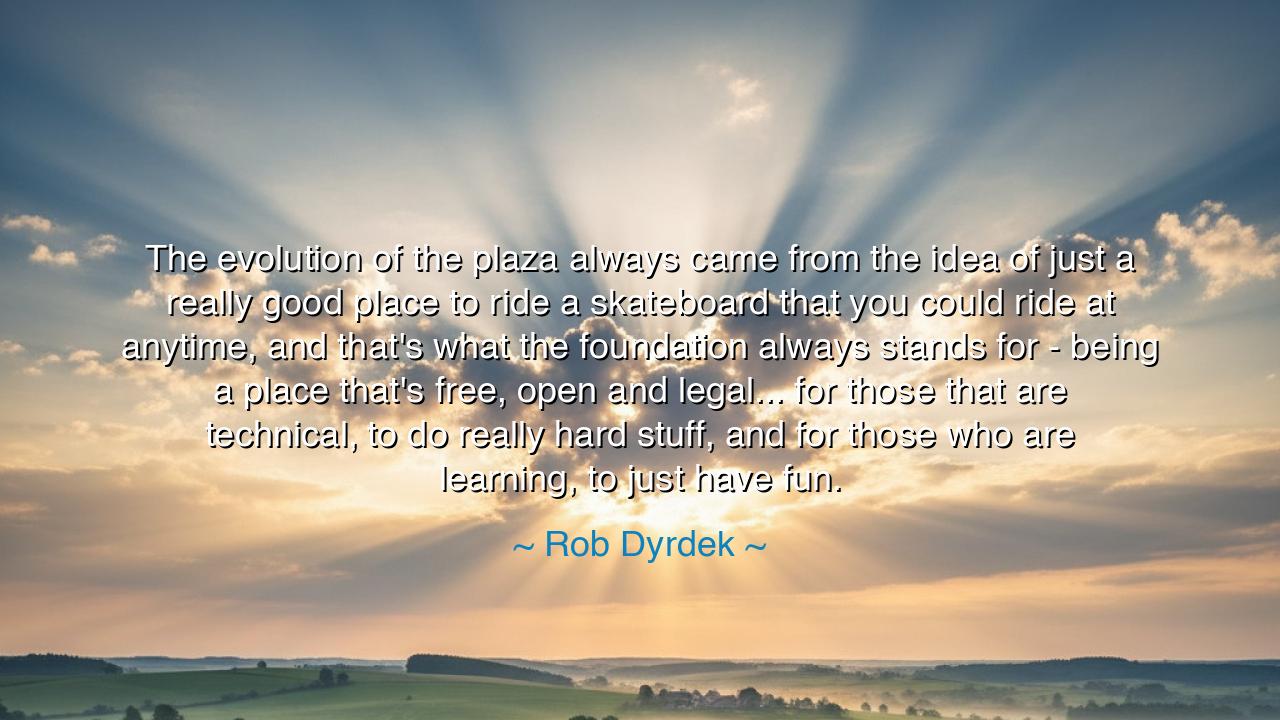
The evolution of the plaza always came from the idea of just a
The evolution of the plaza always came from the idea of just a really good place to ride a skateboard that you could ride at anytime, and that's what the foundation always stands for - being a place that's free, open and legal... for those that are technical, to do really hard stuff, and for those who are learning, to just have fun.






In the chronicles of human endeavor, there are spaces that transcend mere bricks and mortar, becoming sanctuaries of skill, creativity, and freedom. Rob Dyrdek’s words, “The evolution of the plaza always came from the idea of just a really good place to ride a skateboard that you could ride at anytime, and that's what the foundation always stands for - being a place that's free, open and legal... for those that are technical, to do really hard stuff, and for those who are learning, to just have fun,” illuminate such a space. Here lies not merely a physical location, but a living testament to the principles of freedom, mastery, and the joy of learning. Like the agoras of Athens or the forums of Rome, plazas become arenas where human potential is nurtured, where skill and play coalesce in harmonious pursuit.
From the ancient cities of Mesopotamia to the public squares of Renaissance Europe, communal spaces have always served as crucibles for talent and civic life. They are where the young observe the seasoned, where the novice practices under the gaze of experience, and where all may participate freely in the rites of community. Dyrdek’s vision of a plaza as a place “free, open and legal” mirrors this timeless ideal: a sanctuary where both mastery and exploration coexist, unbound by fear or restriction, yet guided by respect for others.
History offers vivid examples of such spaces fostering growth. In Renaissance Florence, workshops and piazzas were open for artisans, apprentices, and merchants to demonstrate skill, trade knowledge, and experiment with innovation. Michelangelo and Leonardo da Vinci, though masters in their own right, thrived in an environment that celebrated both technical excellence and the joy of creation. The plaza Dyrdek describes is a modern echo of this principle: a place where technical prowess is revered, yet beginner joy is equally honored, reminding us that community thrives when opportunity is extended to all.
The evolution of the skateboard plaza, as Dyrdek recounts, is grounded in the philosophy of inclusivity and progression. For the technical skater, it offers a canvas upon which the most difficult maneuvers can be attempted and perfected. For the novice, it is a playground where confidence is nurtured and the thrill of discovery is honored. This dual purpose reflects a profound understanding of human growth: excellence and enjoyment are not opposites but complementary forces that elevate both individual skill and collective spirit.
A real-life illustration can be found in the Venice Beach Skate Plaza, where Dyrdek himself rose from a passionate youth to a figure who championed skateboarding culture. There, generations of skaters learned not only tricks and technique, but also respect, patience, and perseverance. From daring flips to tentative first rides, the plaza embodies both challenge and encouragement, teaching that spaces designed with freedom and legality allow talent to flourish safely and joyfully.
The philosophical lesson embedded in Dyrdek’s reflection transcends skateboarding. It is a meditation on the creation of spaces—literal or metaphorical—where people may practice, experiment, and grow without fear. Communities flourish when freedom, openness, and legality coexist, allowing the technically adept to push boundaries while permitting the less experienced to delight in participation. This balance ensures that growth, creativity, and enjoyment are shared, not hoarded.
For those who seek to apply this wisdom in daily life, the teaching is clear. Design and cherish spaces—whether physical, digital, or social—that are inclusive, safe, and supportive. Encourage both mastery and play, skill and exploration. Recognize that excellence is cultivated not only through instruction and discipline but also through joy, freedom, and respect for shared rules. By doing so, one fosters an environment where creativity and community reinforce one another.
Thus, Rob Dyrdek’s vision stands as a timeless parable: a plaza, like any nurtured space, is more than its materials; it is a vessel of freedom, a stage for mastery, and a playground for joy. Let those who build, teach, or participate remember that true greatness arises where safety, legality, and openness coexist, and where every individual—whether novice or expert—is empowered to ride, to explore, and to flourish.






AAdministratorAdministrator
Welcome, honored guests. Please leave a comment, we will respond soon